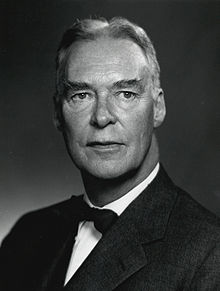Christian Herter (politician)
Christian Archibald Herter (born March 28, 1895 in Paris , † December 30, 1966 in Washington, DC ) was an American politician of the Republican Party . He was from 1953 to 1956 governor of Massachusetts , and from 1959 to 1961 Minister of Foreign Affairs .
Early life
Christian Herter was born in 1895 as the son of the American artist Albert Herter and Adele McGinnis in Paris, where his parents met and married. There he attended the École Alsatienne from 1901 to 1904 . In 1904 the family moved to New York City , where Christian attended Browning School until 1911 . He then studied at Harvard University and graduated in 1915. The following year he became an attaché at the American embassy in Berlin .
Political career
Herter was first elected to the Massachusetts House of Representatives in 1931 , to which he was a member until 1943; from 1939 he was speaker of this parliamentary chamber. From 1942 to 1953 he sat in the House of Representatives of the United States , where he appeared, among other things, as a proponent of the Marshall Plan . In 1948 he was a board member of the American Committee on United Europe . In 1950 he was elected to the American Academy of Arts and Sciences . In 1953 he was elected governor of Massachusetts. An attempt Harold Stassen President Eisenhower in 1956 to persuade Herter instead of Richard Nixon to the Vice President to make, failed.
After Herter did not run in the gubernatorial elections in 1956, he was appointed Vice Secretary of State ( United States Under Secretary of State ) in February 1957 . When Secretary of State John Foster Dulles became seriously ill, President Eisenhower appointed Herter to succeed him in his cabinet in April 1959 . After John F. Kennedy's election as president in 1960, Herter worked as an elder statesman on various commissions and advisory boards. In 1961 he was awarded the Presidential Medal of Freedom ; the following year he became the United States' first sales representative .
Herter was considered an internationalist who was strongly committed to improving economic and political cooperation with Europe. He died in Washington in 1966 at the age of 71 and was buried in Millis, Massachusetts.
Private life
In 1917, Herter married Mary Caroline Pratt (1895–1980), who was wealthy by inheritance . She was the daughter of Frederic B. Pratt, a longtime president of the Pratt Institute , and the granddaughter of entrepreneur and philanthropist Charles Pratt . The couple had a daughter and three sons, among them Christian Archibald Herter junior, who worked as a diplomat.
Legacies
Christian Herter founded the Paul H. Nitze School of Advanced International Studies (SAIS) in Washington in 1943 together with Paul Nitze , which is now (2011) at Johns Hopkins University , whose headquarters are in Baltimore , Maryland , and which is one of the most renowned Research institutions in the field of international politics belongs.
The American Foreign Service Association has awarded a Christian A. Herter Prize since 1968 .
Works
- Christian Herter: Toward an Atlantic Community. 1963
literature
- H. William Brands: Christian Herter. In: Edward S. Mihalkanin (Ed.): American Statesmen: Secretaries of State from John Jay to Colin Powell . Greenwood Publishing 2004, ISBN 978-0-313-30828-4 , pp. 247-253.
- Christian A. Herter , in: Internationales Biographisches Archiv 06/1967 of January 30, 1967, in the Munzinger Archive ( beginning of the article freely available)
Web links
- Christian Herter in the Biographical Directory of the United States Congress (English)
- Christian Herter in nndb (English)
- Literature by and about Christian Herter in the catalog of the German National Library
- Christian Herter in the National Governors Association (English)
- Christian Herter at the Miller Center of Public Affairs at the University of Virginia (English)
- Christian Herter in the database of Find a Grave (English)
| personal data | |
|---|---|
| SURNAME | Herter, Christian |
| ALTERNATIVE NAMES | Herter, Christian Archibald (full name) |
| BRIEF DESCRIPTION | American politician |
| DATE OF BIRTH | March 28, 1895 |
| PLACE OF BIRTH | Paris , France |
| DATE OF DEATH | December 30, 1966 |
| Place of death | Washington, DC |




